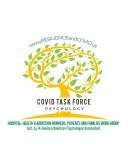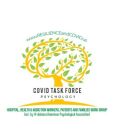Trauma
When Pandemic Trauma Hits Home
How one psychologist became part of the mission.
Posted December 1, 2020
This is Part 2 of a three-part series about the origin, purpose, and goals of this blog, whose aim is to help people to cope and manage the many varieties of psychological trauma wrought by COVID-19.
Read Part 1: "Psychological Impact of COVID-19 on You" by Maureen O'Reilly-Landry, Ph.D., and Patricia A. O'Gorman, Ph.D.
Read Part 3: "On the COVID-19 Battlefield: Providing psychological guidance, resilience, and hope" by Patricia A. O'Gorman, Ph.D.
This post was written by Maureen O'Reilly-Landry, Ph.D.
It is March, the beginning of the pandemic. I am in New York City, soon to be the epicenter of the COVID-19 crisis. As a psychoanalyst and a medical psychologist, I am well-versed in the psychological issues surrounding medically induced psychological trauma. I co-chair (with Dr. Eric Sherman) the Psychoanalysis and Healthcare Committee in APA’s Division of Psychoanalysis. I previously published a book on the subject, A Psychodynamic Understanding of Modern Medicine. And I know personally what it is like to have a child in the Intensive Care Unit. Though not during a pandemic.
My story—my motivation for wanting to take meaningful action—is not primarily a professional one. My husband and son are doctors at a New York City medical center that is about to be overrun with patients who are devastatingly sick from this novel coronavirus. My husband is in a leadership role there. His job is to solve the impossible-to-solve problems we see on TV every night.
My son is a freshly minted physician, an intern brimming with enthusiasm to use his knowledge and skills in a meaningful way. He has been a “Doctor” for 10 months. He and my husband both seem so eager.
As a psychologist, I am able to work safely from home via video and telephone, but they don’t have this luxury. They must go in. They seem to want to go in. I anxiously wonder how long they will be able to keep up before the emotional toll becomes too great. Will they develop PTSD—or suffer an even worse fate?
What will it be like for them now? They are doctors, yes. But also the father and older brother to a young man who was in the Neurological Intensive Care Unit at the age of 20. That had been a long 2½ months—not being sure whether he would make it.
He’s thriving now, but still, traumatic memories can linger. So do the feelings. But sometimes, we push them away completely, only to have them pour out later when we get triggered by something that reminds us of the original trauma. I don’t think I could bear working in an ICU after that. But there they are.
I am surprised to notice the absence of fear on their faces as they discuss the work. I see only determination and the sense of an important and meaningful mission. But are they pretending for me, the wife and mother? Are they trying to protect me from knowing their fear? I really can’t tell.
Maybe that’s why my husband is insisting I go out of town. Is it only to protect me from the virus? Who knows? Maybe it’s also to prevent me from seeing the toll that dealing with the virus will take on them.
Identifying My Personal Mission
I’m going to be living away now. I relish the opportunity to get back to my late-in-life amateur painting career. I bring the easel and brushes. Why does art no longer have any appeal? I realize something. I don’t want to paint. I want to be part of the mission. Their mission. The country’s mission. Now, I am certain. This is my mission, too.

I will use my own skills to try to make a difference. I can stay local, or I can think on a grander scale. I’m feeling ambitious. I reach out to respected colleagues in the American Psychological Association (APA). Psychoanalysts, trauma specialists, health psychologists. I belong to those APA divisions, so they are the ones I look to. “How do I join the APA COVID Task Force?” I ask. My colleagues look into it.
How can there not be one? But it’s early in the game—still only March. The APA has 56 different divisions, so there may be one somewhere—maybe even more than one, but no one can find anything official. My colleagues love the idea of a COVID-19 Psychology Task Force. It is important. There will be a great need.
Within days, the Trauma Division launches an interdivisional task force with Psychoanalysis and International Psychology along with them as founding members. We are a grassroots group of professional psychologists. Eleven more divisions join.
Finally, my mission is clear: I will create a workgroup within this Task Force that addresses the coronavirus’s negative psychological impact on American hospitals. We will provide resources for education and training.
Eventually, I recruit Dr. Patricia O’Gorman to be co-chair. With her vast expertise in addictions, psychological trauma, and outpatient medical settings, we can now include all health care facilities under our umbrella. Also, I am urban; she is rural. Thus, we have the Hospital, Healthcare, and Addiction Workers, Patients, and Families workgroup within the COVID Psychology Task Force.
How We Can Help You or Your Medical Community
This Psychology Today blog, Psychological Trauma, Coping, and Resilience: COVID-19 and pandemics, seeks to educate and inform the psychological and medical communities and the general public about the many manifestations of psychological trauma during a pandemic. It will provide tips and ideas about how to cope and even ways to foster resilience and post-traumatic growth.
Many varieties of psychological trauma and distress may arise during this pandemic. Our main task has been to collect educational, training, and informational resources that will assist hospitals, addiction treatment centers, and other medical facilities affected by COVID-19. We create our own resources to address the needs of those who have been overlooked—people in leadership positions and janitors, for example.
At one meeting, a health psychologist says, “The hardest part will be dissemination to medical facilities and the public.” One sleepless night, I go to my computer. I submit a proposal to Psychology Today for our group to do a blog on Pandemic Psychological Trauma. They love the idea. So here it is.
We have constructed this ongoing series of educational articles, compelling stories, and tip sheets for medical practitioners, mental health professionals, essential workers, COVID-19 patients, and the families of all of the above. Some have videos and links for further information.
Our authors, highly-credentialed experts in their fields, may also have personal experiences of the pandemic that they are willing to share to help others.
Do you have useful resources to share or have topics you would like us to address? Please let us know.
Have you found something that might help another person or organization? Please share it with them. In this way, you will be part of the mission, too.
Dr. O’Reilly-Landry is a clinical psychologist, psychoanalyst, and couple therapist with expertise in psychological trauma in medical settings and the interpersonal dimension of modern medicine. She co-chairs both the Psychoanalysis and Healthcare Committee (Division 39, APA), and the COVID Task Force group sponsoring this blog. Her edited book, A Psychodynamic Understanding of Modern Medicine was deemed "essential reading" by Contemporary Psychotherapy. She is on the clinical faculty in the Psychiatry Department of Columbia University Irving Medical Center and teaches a course on medical illness and physical suffering at the New York University Postdoctoral Program in Psychotherapy and Psychoanalysis.




